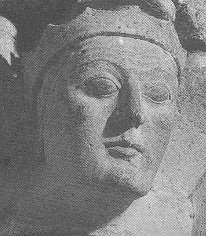Eleanor of Aquitaine

Aquitaine, a region comprising the southern third of France which roughly corresponded with one of the 3 Roman divisions of Gaul, was at the beginning of the 12th century a fading independent duchy, still free from the control of any kingdom, but not on the strongest footing. William X, the duke of Aquitaine, had witnessed his province shrink from its zenith of power under his grandfather, and was not an especially formidable ruler. At the age of 38, William died of food poisoning on a pilgrimage to Santiago de Compostela, and left his only surviving child and heir, his 15-year old daughter Eleanor ("Alia-Aenor," or the "other Aenor," after her mother, Aenor de Chastellerault), as the ward of Louis VI ("the Fat"). Within just a few days, the opportunistic Louis arranged the marriage of Eleanor to his own son, the future Louis VII, thereby claiming Aquitaine for France.
Or so one would have thought at the time -- but Eleanor would grow to be a most resourceful woman, succeeding at playing a man's game (statecraft) while using every tool available to her as a woman. Within the corridors of 12th century European power, she was a foremost strategist of the gender politics of her time.
Young Louis, who succeeded his father to the French throne shortly after their wedding, was a boy better suited for reading than horseplay in general, but his piety led him to direct the Second Crusade to the Holy Land. Eleanor, now the mother of his eldest daughter, dutifully followed her husband from post to post, subtly transforming herself along the way from a compliant ingénue to a boisterous lady-to-be-reckoned-with. Her emotional dominance over the monkish Louis was clear, and soon there were rumors that she had committed adultery with, among others, Saladin, who would become a leading soldier of the Syrian army. (The affairs may have been real enough, but the liaison with Saladin was probably a revisionist fantasy.) Upon their return, Louis sought an annulment of their marriage from Eugenius III on the grounds of consanguinity (close kinship -- never mind that Eleanor was already the mother of his 2 daughters). Eugene granted the annulment in 1152, and in the bargain Eleanor managed to regain possession of Aquitaine.
Wasting no time at all, the 30-year old Eleanor turned to the one man outside of the Holy Land who most threatened Louis' sovereignty, a 19-year old boy named Henry who had extensive French holdings and a clear shot at the throne of England -- seducing the impetuous boy and securing him as her next groom. At her coronation as Henry's queen in Worcester a few years later, Eleanor declared, with an astute sense of her own life's purpose, "I am queen of England, by the wrath of God!"
Now Aquitaine, Anjou, Normandy and England were all under one banner, and it was inevitable that the hen-pecked Louis would have felt slighted; so Louis sent his forces against Henry. Check by bloody check, the bitter rivalry of two kings over Eleanor and her huge tracts of land initiated a conflict that would plague both England and France for decades.
Meanwhile, Eleanor bore Henry 5 sons and 3 daughters -- certainly enough progeny to guarantee the succession to all of Henry's realm, but more than enough to give Henry a lifetime of grief. Henry and Eleanor began to grow apart as Eleanor advanced in age, and Eleanor relocated to Poitiers, setting up her own trend-setting court (which became a center of artistic and literary taste) and using her sons as weapons against the philandering Henry.
In 1173, she returned to London to help her sons Henry, Richard (her personal favorite), Geoffrey and John lead a rebellion against King Henry, but her husband had her placed under house arrest for the next decade while he negotiated with his hot-headed boys. Following the deaths of Henry the Younger and Geoffrey, Eleanor's favorite son Richard became the natural successor to Henry, who died in 1189, a man broken and defeated by Eleanor's skillful uses of maternal power.
Richard promptly went off on the Third Crusade, leaving Eleanor as regent of England. Eleanor kept her youngest son John in check, who was attempting to mount his own rebellion while Richard was off fighting infidels; but after Richard's return and subsequent death, she fought to preserve John's authority, throwing off the challenges of her own grandson, Geoffrey's son Arthur of Brittany, in his attempts to overtake John's French territories. She also attempted to play her hand in diplomacy, again to preserve John's authority, by crossing the Pyrenees at age 78 to seize her granddaughter, Blanche of Castile, and deliver her to the French court to marry the future king, Louis VIII; it was Eleanor's hope, in the years immediately before her death (on this date in 1204 at Fontevrault, France, at the age of about 82), that the alliance would cause an end to the feud between the English and French monarchs; but Philip II kept up his assaults, resulting in John losing all of his French lands except for a portion of Poitou and his mother's beloved Aquitaine.
Labels: France, Kings and Queens





0 Comments:
Post a Comment
Subscribe to Post Comments [Atom]
<< Home